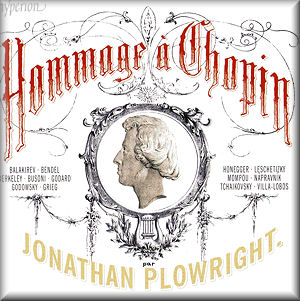 |
 |
|


alternatively
CD:
AmazonUK
AmazonUS
MDT
|
Hommage à Chopin
Mili BALAKIREV (1837-1910)
Impromptu on the Themes of two Preludes by Chopin (1907) [4:58]
Franz BRENDEL (1833-1874)
Hommage à Chopin, Op. 111/1 (1867) [5:33]
Edvard GRIEG (1843-1907)
Studie (Hommage à Chopin), Op. 73/5 (1905) [1:48]
Ferruccio BUSONI (1866-1924)
Ten Variations on a Theme of Chopin in C minor, BV213a (1884, rev. 1922) [10:49]
Edvard NAPRÁVNÍK (1839-1916)
Notturno (La Réminiscence de Chopin), Op. 48/1 (published 1894) [5:56]
Peter Ilyich TCHAIKOVSKY (1840-1893)
In poco di Chopin, Op. 72/15 (1893) [3:00]
Arthur HONEGGER (1892-1955)
Souvenir de Chopin (1946) [2:01]
Lennox BERKELEY (1903-1989)
Three Mazurkas, Op. 32/1 (1940) [5:48]
Heitor VILLA-LOBOS (1887-1959)
Hommage à Chopin (1949) [7:03]
Federico MOMPOU (1893-1987)
Variations sur une thème de Chopin (1957) [21:27]
Benjamin GODARD (1849-1895)
La Lanterne mystique, Op. 66 (1888) – No. 3, Hommage à Chopin [2:00]
Leopold GODOWSKY (1870-1938)
Walzermasken (1911) – No. 7, Profil (Chopin) [3:50]
Theodor LESCHITZKY (1830-1915)
Contes de jeunesse, Op. 46 (1902) – No. 9, Hommage à Chopin [4:41]
 Jonathan Plowright (piano)
Jonathan Plowright (piano)
rec. Potton Hall, Suffolk, 30 July-1 August 2009. DDD
 HYPERION CDA67803 [79:40]
HYPERION CDA67803 [79:40] 
|
|
|
The combination of top-flight artist, superb recording quality
and truly imaginative, attractive programming seems quintessentially
Hyperion. With this disc the enterprising record company has
produced yet another winner.
The Balakirev is a triumph. In 1907, Balakirev was persuaded
by Konstantin Tchernov to write down an improvisation on the
Preludes No. 11 in B and No. 14 in E flat minor. The work contains
moments of great subtlety as well as Islamey-like all-out
virtuosity. Jonathan Plowright seems equally at home in either
mode of expression. The way Balakirev keeps on referring back
to the original Chopin music and then veering off from it into
his own world is a characteristic of the piece, and the movement
between the two is fascinating.
Franz Brendel’s “Pièce caractéristique” is in the flowing mode
of Liszt - of whom Brendel was a pupil - and comes at times
very close to Chopin’s own expressive world. The Grieg is a
mere 1:40 and is part of the Op. 73 “Spannungen” (Moods). It
is a gorgeous, delightful miniature that makes identifiable
reference to Chopinesque writing without losing the identity
of the composer.
The Busoni Chopin Variations, dedicated to Reinecke, are heard
in the 1922 revision. Plowright conveys a sense of mystical
secrecy about the opening bars, contrasting this with the granite-like
strength of the louder address. The variations emerge organically
from the statement of the original - itself preceded by an introduction.
The scherzando variation is a particular delight in Plowright’s
hands; his staccato touch is magnificent, his pedalling carefully
considered. The fugal scherzo - around seven minutes in - is
delivered in truly Mephistophelian mode.
The Nápravník Notturno comes in stark contrast. Improvisatory
in nature, it contains a fairly adventurous middle section that
raises the piece from the status of trivia. Tchaikovsky’s Un
poco di Chopin is a truly Russian take on Chopin. It could
come straight out of one of Tchaikovsky’s ballets. Plowright
is particularly impressive in the right-hand filigree the piece
demands.
The Honegger is interesting – it comes from a film called Un
ami viendra ce soir (1946) - a resistance story set in an
insane asylum. The later musical language is evident, but Honegger
finds a lovely sense of yearning here. The Berkeley Mazurkas
that follow appear as a harmonic extension of the Honegger.
Villa-Lobos’s Hommage is in two movements, a ruminative,
rather dark of mood Nocturne and a more muscular Ballade. As
Jeremy Nicholas points out in his notes, there are distinct
points of contact between this and Chopin’s Ballades - especially
the First. Only the end seems rather abrupt.
The Mompou is the most extended piece on the disc, at 21:27.
The idea of innocence recalled in music is central here. Mompou
takes the Chopin Prelude, Op. 28/7 as his starting point for
a magical exploration of harmony and texture - other references
are woven in. This is surely the highlight of the disc, and
Plowright is at his very best here. Interest never sags – it
is almost as if Plowright is on a personal mission to persuade
the listener of the greatness of the piece.
After that, the final two works emerge almost as encores. The
Godowsky features some wonderful voicing by Plowright. The performance
is most affectionate, as is that of Leschitzky’s charming Hommage
à Chopin.
The recording is of the very first order, readily reproducing
Plowright’s myriad subtleties. Superb.
Colin Clarke
|
|
|












